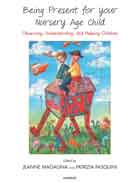Being Present for Your Nursery Age Child: Observing, Understanding, and Helping Children

Book Details
- Publisher : Routledge
- Published : 2014
- Cover : Paperback
- Pages : 336
- Category :
Child and Adolescent Studies - Catalogue No : 35295
- ISBN 13 : 9781782201410
- ISBN 10 : 1782201416
Customer Reviews
Our customers have given this title an average rating of 5 out of 5 from 1 review(s), add your own review for this title.
Deirdre Wilkins on 05/06/2014 16:03:46




 (5 out of 5)
(5 out of 5)
This book vividly describes and discusses the Tempo Lineare Project: a therapeutic approach to nursery school education: a school for life. The book will be of interest to teachers, psychotherapists and parents of nursery school aged children. The importance of the dynamic, triangular relationship between parent, child and teacher is highlighted. Threads of psychoanalytic thought are woven throughout the book, enabling parents to better understand their children.
The Tempo Lineare Nursery is set in the 1st Municipality in centre of Rome and promoted by the City of Rome local government to become part of the Rome Education Services. It was first opened by Patrizia Pasquini in 1999 for children from zero to three years and their parents. The school was so appreciated by the families that it was expanded to include children aged from four to six years and their parents. Children are accepted from families in the Municipality from all cultures and walks of life, including children with medical, physical disabilities, psychological or neurological problems.
Half of the children admitted were adopted.
Interestingly, Tempo Lineare is situated near the original Casa dei Bambini, the first nursery school in Rome, Maria Montessori’s Children’s House. Montessori emphasised the intellectual/academic and cognitive development of the child using her specially designed didactic apparatus. However, she did believe in “following the child” and also encouraged spontaneous play and work within a prepared environment. The first children in Montessori’s school were admitted from the slum streets in the centre of Rome. In the Tempo Lineare Nursery, it is the emotional and creative development of the child which is emphasised, within a warm , colourful and attractively prepared environment.
The ideas in this book are based on the psychoanalytic observational studies according to the Tavistock Clinic method of Infant and Young Child Observation. The observational contributions in this book are rich in detail and bring individual children and group relationships in the Nursery School to life for the reader. They include vignette observations by the Head of the School Patrizia Pasquini and psychotherapists Carlo Busato Barbaglio, Head of the Italian Institute of Psychoanalysis Child Training, and Jeanne Magagna, child, adult and family psychotherapist who teaches Child Psychotherapy in Florence and Venice Italy. Both mothers and fathers are taught to use participant observation and are encouraged to observe their own child at home and at school.
Special emphasis is placed on the spontaneous, imaginative, creative play of the individual child and on the development of the emotional relationship between the child and mother and/or father, teacher and psychotherapist. The parents have the crucial task of helping the child develop an internal space for holding emotions, phantasies and dreams and allowing thoughts and other emotions to arise in relation to them. This is particularly achieved by the both father and mother spending time in the school, playing with their child and becoming aware of their own inner child. The child is seen to develop a capacity to learn, to lead, to follow instructions, and make compromises. Above all, the child is encouraged to develop his inner strength, self-esteem, to be creative, sociable, curious, to consider others and to think and express himself clearly.
This book opens doors into this “school for life” and gives a sensitive and vivid picture of this containing environment. It is a rich and useful resource in actively supporting parents, grandparents and their children. The final chapter “Parents Speaking” includes fourteen moving, personal accounts of their time at Tempo Lineare and what this has meant to them and their families. This book is also essential reading for any professional interested in preventative work created in collaboration with parents of children of nursery school age.
Reviewed by Deirdre Wilkins, retired Teacher and Principal of two Montessori schools; Early Years Consultant and Nursery Inspector, M.A in Education and Psychoanalysis and an additional M.A in Art History. Deirdre has also completed the Observational Studies Course at the Tavistock Clinic.

